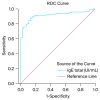Elevated Immunoglobulin E Serum Levels: Possible Underlying Factors That Can Cause an Inborn Error of Immunity in the Pediatric Population with Recurrent Infections
- PMID: 38920971
- PMCID: PMC11201012
- DOI: 10.3390/antib13020047
Elevated Immunoglobulin E Serum Levels: Possible Underlying Factors That Can Cause an Inborn Error of Immunity in the Pediatric Population with Recurrent Infections
Abstract
Elevated immunoglobulin E (IgE) levels are commonly associated with allergies. However, high IgE levels are also found in several other infectious and non-infectious disorders. Elevated IgE levels typically suggest allergies, eczema, or recurrent skin infections. Hyperimmunoglobulin E (hyper-IgE) levels typically reflect a monogenic atopic condition or inborn immune defects with an atopic phenotype. The aim of our research is to investigate and observe the clinical characteristics of children with increased IgE levels who have previously manifested infectious diseases. Furthermore, the retrospective study considers other factors, such as demographic characteristics (sex, area/environment, and age), and their effect on IgE serum levels. To answer this question, we conducted a one-year hospital-based retrospective study that included 200 hospitalized children who had at least two viral or bacterial infections in the six months preceding hospitalization. Measurements of IgE and allergen panels (respiratory and digestive) using blood samples revealed that individuals who tested positive for the body's synthesis of hyper-IgE were not observably allergic to any potential allergens despite having higher total serum IgE. According to the results, there was a strong correlation between elevated IgE serum levels and a history of infectious diseases among the patients.
Keywords: HIES; clinical manifestation; hyper-IgE; infectious diseases.
Conflict of interest statement
The authors declare no conflicts of interest.
Figures





References
LinkOut - more resources
Full Text Sources

